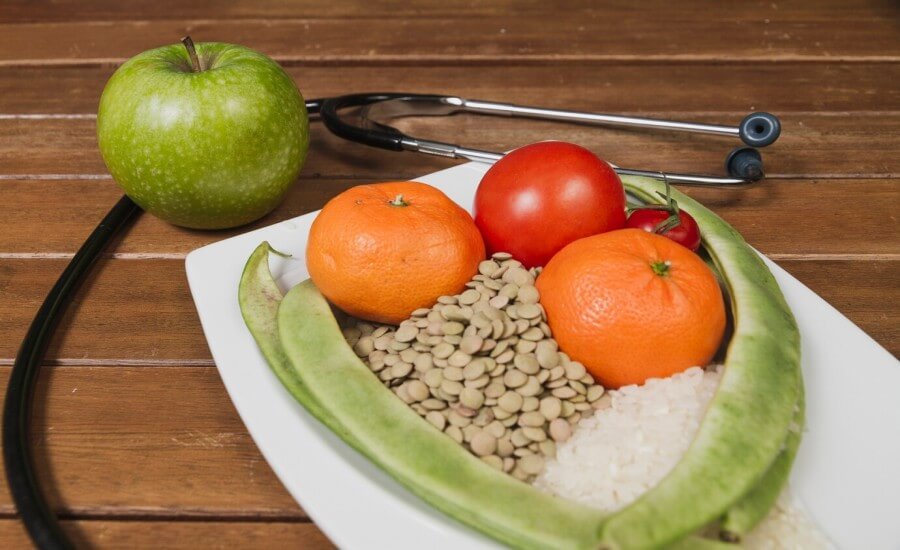Diabetes management stands at a critical crossroads where dietary choices can significantly impact health outcomes. This comprehensive analysis explores how plant-based eating can transform diabetes care through multiple perspectives – medical, nutritional, psychological, and practical. By weaving together clinical research, nutritional science, lived experiences, and sustainable practices, we reveal how vegan diets offer a powerful approach to blood sugar management that extends beyond glycemic control to enhance overall wellness. From fiber-rich foods that moderate glucose absorption to reduced inflammation and improved insulin sensitivity, plant-based eating provides a sustainable, compassionate path toward diabetes management that nurtures both personal health and planetary wellbeing.
LENS 1: Medical Analysis
The Diabetes-Diet Connection: A Scientific Foundation
Diabetes fundamentally involves disrupted glucose metabolism, where either insulin production is insufficient (Type 1) or cells resist insulin’s effects (Type 2). Plant-based diets offer multiple physiological mechanisms that directly address these core issues. Research from the Physicians Committee for Responsible Medicine has demonstrated that participants following a low-fat vegan diet experienced improved insulin sensitivity and significant reductions in HbA1c levels compared to those following conventional diabetes diets.
Beyond Medication: How Plants Moderate Blood Sugar
While pharmaceutical interventions remain important for many people with diabetes, plant-based nutrition creates a metabolic environment that may reduce medication requirements over time. Dr. Neal Barnard, endocrinologist and researcher, notes that “many patients are able to reduce their insulin doses within weeks of adopting a whole-food, plant-based diet due to the dramatic improvements in insulin sensitivity.”
Medical Deep Dive: Plant-Based Mechanisms for Diabetes Management
| Mechanism | Plant Foods | Clinical Impact |
| Improved insulin sensitivity | Leafy greens, berries, whole grains | Reduced insulin requirements |
| Reduced lipotoxicity | All whole plant foods (naturally low in saturated fat) | Enhanced beta cell function |
| Anti-inflammatory effects | Berries, cherries, leafy greens, spices | Decreased insulin resistance |
| Enhanced incretin response | Legumes, intact whole grains | Improved postprandial glucose control |
| Reduced AGE formation | All plant foods prepared at lower temperatures | Decreased vascular complications |
Weight Management: The Critical Connection
“Excess body fat, particularly visceral fat, drives inflammation and insulin resistance,” explains Dr. Michelle McMacken, internal medicine physician at NYC Health + Hospitals/Bellevue. “Plant-based diets naturally support healthy weight management through higher fiber, lower caloric density, and reduced fat intake without requiring careful portion control.” Research published in the Journal of Geriatric Cardiology showed that participants following a plant-based diet lost significantly more weight than those on a conventional diabetes diet, even without calorie restrictions.
Complication Prevention: The Vascular Connection
Diabetes complications primarily stem from vascular damage. Plant-based diets address multiple risk factors simultaneously:
- Lower LDL cholesterol through reduced saturated fat and increased soluble fiber from oats, barley, and legumes
- Improved blood pressure via increased potassium from fruits and vegetables and reduced sodium
- Enhanced endothelial function through dietary nitrates from leafy greens and beets
- Reduced oxidative stress through thousands of antioxidants found exclusively in plant foods
- Decreased inflammation from phytonutrients and elimination of pro-inflammatory animal products
Common Misconceptions vs. Reality
Misconception: Fruit is too high in sugar for people with diabetes.
Reality: Whole fruits consistently show beneficial or neutral effects on glycemic control due to their fiber, polyphenols, and overall nutrient matrix. Studies show fruit consumption is associated with lower diabetes risk and better management outcomes.
Misconception: People with diabetes need animal protein for blood sugar stability.
Reality: Research shows that plant proteins from legumes, nuts, and seeds provide superior glycemic control compared to animal proteins due to their fiber content and lower saturated fat.
Voice of Experience: The Endocrinologist’s Perspective
“What continues to astonish me after twenty years of clinical practice is how quickly blood glucose patterns can normalize with plant-based nutrition,” says Dr. Rajiv Sharma, endocrinologist and diabetes specialist. “Many patients see dramatic improvements in fasting blood glucose within 48-72 hours, often requiring rapid medication adjustments to prevent hypoglycemia. The challenge becomes educational – teaching patients how to safely reduce medications as their natural insulin sensitivity improves.”
LENS 2: Nutritional Framework
Nutritional Architecture: Building a Blood-Sugar Friendly Plate
The nutritional composition of a well-designed vegan diet naturally aligns with optimal diabetes management. The emphasis on high-fiber, nutrient-dense, whole foods creates a dietary pattern that moderates glucose absorption while providing sustained energy throughout the day.
Fiber: The Unsung Hero of Glycemic Control
Plant-based diets provide abundant dietary fiber, which plays multiple roles in diabetes management:
- Slows carbohydrate absorption, preventing glucose spikes
- Improves insulin sensitivity through gut microbiome modulation
- Creates greater satiety, supporting weight management
- Binds to cholesterol, reducing cardiovascular risk
“The average American consumes just 15 grams of fiber daily, while those following a whole-food, plant-based diet typically consume 40-50 grams,” notes Susan Green, RD, CDE, a plant-based diabetes educator. “This difference alone explains much of the glycemic advantage of plant-based eating.”
Nutritional Deep Dive: Glycemic Impact of Plant Foods
| Food Category | Glycemic Load | Fiber Content | Beneficial Compounds |
| Legumes | Low | High | Resistant starch, phytates, plant protein |
| Intact whole grains | Low-medium | High | Beta-glucans, resistant starch |
| Non-starchy vegetables | Very low | Moderate | Nitrates, polyphenols, carotenoids |
| Nuts and seeds | Low | Moderate | Plant sterols, unsaturated fats |
| Berries and stone fruits | Low | Moderate | Anthocyanins, ellagic acid |
| Tropical fruits | Medium | Moderate | Bromelain, vitamin C, carotenoids |
Essential Nutrient Considerations for Vegan Diabetes Management
A thoughtfully planned vegan diet can provide all essential nutrients while optimizing diabetes management. Key nutrients to emphasize include:
- Vitamin B12: Essential for nerve health, particularly important since diabetes increases neuropathy risk. Reliable supplementation is necessary.
- Alpha-Lipoic Acid: Found in small amounts in plant foods like spinach and broccoli, this antioxidant shows promise for diabetic neuropathy. Some people may benefit from supplementation.
- Omega-3 Fatty Acids: Plant sources like flaxseed, chia, hemp, and walnuts provide ALA, which can partially convert to EPA and DHA for anti-inflammatory effects.
- Vitamin D: Limited in most foods, but critical for glucose metabolism. Supplementation and brief sun exposure are typically recommended.
- Zinc: Important for insulin production and storage. Emphasize legumes, nuts, seeds, and whole grains.
Synergistic Food Combinations for Optimal Blood Sugar Control
Certain food pairings create enhanced glycemic benefits:
- Legumes with acidic foods (vinegar, lemon) further reduces their glycemic impact
- Cinnamon with oatmeal improves insulin signaling
- Green vegetables with healthy fats improves nutrient absorption
- Berries with nuts provides slow-release energy and antioxidant benefits
Voice of Experience: The Nutritionist’s Perspective
“The beauty of plant-based eating for diabetes lies in its nutritional synergy,” explains Maria Chen, MS, RD, CDE. “Rather than isolating individual nutrients, we focus on dietary patterns that naturally provide fiber, antioxidants, and phytonutrients while minimizing problematic components like saturated fat and excess protein. This creates a biochemical environment where glucose metabolism can normalize over time.”
LENS 3: Psychological Framework
Beyond Blood Sugar: The Mental Health Connection
Diabetes management involves significant psychological considerations, from daily decision-making to long-term health anxieties. Plant-based approaches address these dimensions through multiple pathways.
Food-Mood Connection: Vegan Eating for Emotional Balance
Research from the GEICO workplace study showed that employees who switched to a plant-based diet reported significant improvements in emotional well-being and work productivity alongside their metabolic improvements. These psychological benefits may stem from several mechanisms:
- Improved blood glucose stability reducing mood swings
- Enhanced gut microbiome diversity influencing the gut-brain axis
- Higher intake of antioxidants and anti-inflammatory compounds supporting brain health
- Greater intake of tryptophan-rich foods (legumes, seeds) supporting serotonin production
- Reduced inflammation throughout the body, including the brain
Hidden Benefits: Psychological Advantages of Plant-Based Eating for Diabetes
| Psychological Aspect | Plant-Based Advantage | Real-World Impact |
| Self-efficacy | Active food preparation increases sense of control | Improved treatment adherence |
| Depression risk | Reduced inflammatory markers correlate with improved mood | Lower rates of diabetes burnout |
| Anxiety management | Stable blood glucose prevents hypoglycemia-related anxiety | Decreased stress response |
| Sleep quality | Increased fiber and reduced saturated fat improve sleep | Better next-day glucose control |
| Cognitive function | Improved vascular health supports brain metabolism | Enhanced decision-making capacity |
Food Identity and Diabetes Management
“Diabetes often creates a restrictive relationship with food centered around what can’t be eaten,” notes Dr. Jamie Alexander, health psychologist specializing in chronic disease management. “Plant-based approaches shift the narrative toward abundance—what can be added to the diet rather than what must be removed. This psychological reframing creates sustainable motivation and reduces the sense of deprivation that often undermines long-term adherence.”
Critical Reassessment: When Perfectionism Undermines Progress
While plant-based eating offers substantial benefits for diabetes management, perfectionism can create counterproductive psychological pressure. Research in eating behaviors suggests that flexibility within overall consistent patterns yields better long-term outcomes than rigid adherence. The psychological framework emphasizes progress over perfection, creating sustainable behavioral change through gradual implementation of plant-centered eating.
Voice of Experience: The Psychologist’s Perspective
“What I’ve observed among clients with diabetes who adopt plant-based eating is a profound shift in their relationship with food,” shares Dr. Rebecca Wong, clinical psychologist specializing in chronic disease management. “Food transforms from enemy to ally, from source of stress to source of healing. This psychological shift alone can dramatically improve quality of life, even before the full metabolic benefits become apparent.”
LENS 4: Practical Implementation
From Theory to Table: Making Vegan Diabetes Management Work
Translating nutritional science into daily practice requires practical strategies that accommodate real-world constraints of time, budget, and culinary skill. The practical implementation lens focuses on sustainable approaches that support long-term success.
Transition Strategies: Finding Your Path to Plant-Based Eating
Multiple approaches can work depending on individual preferences and circumstances:
- Gradual transition: Weekly replacing animal-based meals with plant-based alternatives
- Three-week immersion: Complete plant-based eating for three weeks to experience full benefits, then reevaluate
- Daypart approach: Beginning with plant-based breakfasts, then expanding to lunches and dinners
- Familiar foods first: Starting with plant-based versions of familiar favorite meals
Daily Impact: Practical Solutions for Common Challenges
| Challenge | Solution | Benefit |
| Unstable blood sugar during transition | Emphasize lower-glycemic foods initially; test more frequently | Enables safe adaptation while medications are adjusted |
| Dining out confidently | Research menus in advance; focus on bean/lentil dishes, salads, vegetable sides | Maintains dietary consistency for glycemic stability |
| Meal timing constraints | Batch cooking staples (grains, legumes) weekly; utilize freezer meals | Ensures healthy options are always available |
| Travel management | Pack portable foods (nuts, seeds, fruit); research options at destination | Maintains control during high-stress situations |
| Family acceptance | Involve family in meal planning; offer “build-your-own” meal nights | Creates supportive home environment |
Alternative Approaches: Finding Your Plant-Based Path
Plant-based eating exists on a spectrum, and different approaches work for different individuals. Some find success with 100% whole-food, plant-based eating, while others incorporate small amounts of animal products on occasion. The practical lens emphasizes monitoring blood glucose responses to different approaches to identify individual patterns.
Voice of Experience: The Everyday Practitioner’s Perspective
“I’ve lived with Type 1 diabetes for 17 years, with the last 5 being plant-based,” shares Michael Torres, diabetes advocate and blogger. “The most significant change I’ve experienced is the predictability of my blood glucose. My insulin requirements dropped by about 30%, but more importantly, my glucose variability—the swings from high to low—decreased dramatically. I used to operate within a glucose roller coaster despite careful counting. Now, even if I miscalculate somewhat, the fiber and overall composition of my meals creates a buffering effect that gives me greater freedom and confidence.”
Turning Point Analysis: When Plant-Based Eating “Clicks” for Diabetes Management
Most people who successfully implement plant-based approaches for diabetes report a “turning point” approximately 3-6 weeks into their journey when:
- Insulin sensitivity noticeably improves
- Cravings for former foods diminish
- Taste preferences adapt to appreciate the natural sweetness of fruits and vegetables
- Blood glucose patterns become more predictable
- Energy levels stabilize throughout the day
This turning point corresponds with measurable changes in gut microbiome composition and inflammatory markers, creating a positive feedback loop that reinforces the new eating pattern.
LENS 5: Environmental and Social Context
Beyond Personal Health: The Broader Impact of Dietary Choices
Diabetes management occurs within larger environmental and social contexts that influence both individual health and collective wellbeing. The vegan approach to diabetes offers unique advantages in addressing these interconnected factors.
Environmental Factors: The Diabetes-Climate Connection
Climate change and environmental degradation contribute to diabetes risk through multiple pathways:
- Heat stress impacts insulin sensitivity and medication stability
- Air pollution increases insulin resistance through inflammatory mechanisms
- Food insecurity limits access to health-promoting foods
- Water contamination exposes people to endocrine-disrupting chemicals
Plant-based diets address these factors by significantly reducing environmental footprints compared to animal-based diets, with approximately 50-90% lower greenhouse gas emissions, land use, water use, and pollution.
Access and Equity: Addressing Social Determinants of Diabetes Care
Diabetes disproportionately affects communities with limited resources, making affordable, accessible management strategies crucial. Plant-centered approaches offer several advantages:
- Cost-effectiveness: Staples like legumes, grains, and seasonal produce are among the most affordable foods globally
- Cultural adaptability: Plant-based recipes exist in virtually all culinary traditions
- Reduced medication costs: Improved metabolic health may decrease pharmaceutical requirements
- Community reinforcement: Group cooking classes and meal sharing build sustainable support systems
Cultural Milestone: From Medical Fringe to Clinical Mainstream
The evolution of plant-based approaches for diabetes illustrates significant shifts in medical and cultural acceptance:
- 1970s: Considered alternative, with minimal research support
- 1990s: Small clinical studies begin showing benefits for Type 2 diabetes
- 2000s: Major research institutions begin investing in larger trials
- 2010s: Professional medical organizations acknowledge plant-based diets as viable options
- 2020s: Clinical practice guidelines begin incorporating plant-based recommendations
Voice of Experience: The Community Health Perspective
“When we implemented plant-based cooking classes in our community health center, we saw not just improved clinical outcomes but strengthened social connections,” notes Jasmine Williams, MPH, community health coordinator. “Participants began arranging cooking exchanges, sharing garden harvests, and creating informal support networks. The social aspect became as therapeutic as the nutritional changes, particularly for elderly patients who gained both improved health and decreased isolation.”
Perspective Intersection Matrix
| Medical | Nutritional | Psychological | Practical | Environmental | |
| Medical | — | Nutrient interactions affect insulin signaling | Stress hormones impact glucose metabolism | Medication timing must align with meals | Environmental toxins influence insulin resistance |
| Nutritional | Certain foods have drug-like effects on glucose | — | Food choices affect neurotransmitter production | Preparation methods affect glycemic response | Nutrient density correlates with sustainable production |
| Psychological | Mind-body connections influence inflammation | Food preferences shaped by psychology | — | Implementation depends on behavioral psychology | Climate anxiety impacts health behaviors |
| Practical | Clinical recommendations must acknowledge real-world constraints | Nutrient timing affects athletic performance | Cooking skills influence dietary adherence | — | Local food access shapes daily choices |
| Environmental | Pharmaceutical pollution affects ecosystem health | Soil health determines food nutrient density | Nature exposure improves mental health | Seasonal eating aligns with both planetary and personal health | — |
Synthesis & Recommendations
The multi-dimensional examination of vegan approaches to diabetes management reveals powerful synergies where clinical outcomes, nutritional science, psychological wellbeing, practical implementation, and environmental sustainability reinforce each other. The plant-based paradigm offers a unique framework that simultaneously addresses the pathophysiology of diabetes while supporting the broader determinants of health that shape long-term outcomes.
For individuals seeking to implement plant-based approaches for diabetes management, consider these convergent recommendations:
- Partner with healthcare providers for appropriate medication adjustments as insulin sensitivity improves
- Focus on food quality rather than macronutrient ratios alone—emphasize whole, minimally processed plant foods
- Monitor blood glucose patterns to identify personal responses to different foods and combinations
- Build a supportive community, whether in-person or online, to sustain motivation and share practical strategies
- Implement gradual, sustainable changes rather than unsustainable overhauls
- Celebrate non-scale victories like improved energy, reduced inflammation, and enhanced mood alongside improved glucose readings
The freedom that comes from managing diabetes through plant-based nutrition extends beyond glycemic control to encompass greater energy, reduced complication risk, decreased medication burden, and alignment with environmental values. This approach transforms diabetes management from a restrictive regimen into an empowering journey toward comprehensive well-being.
Further Areas of Exploration
- Plant-based approaches for gestational diabetes management
- Micronutrient considerations for different ethnic populations adopting plant-based diets
- The role of intermittent fasting combined with plant-based eating for insulin sensitivity
- Culinary traditions across cultures that naturally align with plant-based diabetes management
- Technology tools and apps supporting plant-based diabetes management
- The economic impact of plant-based approaches on healthcare costs
- Plant-based strategies for athletic performance with diabetes












